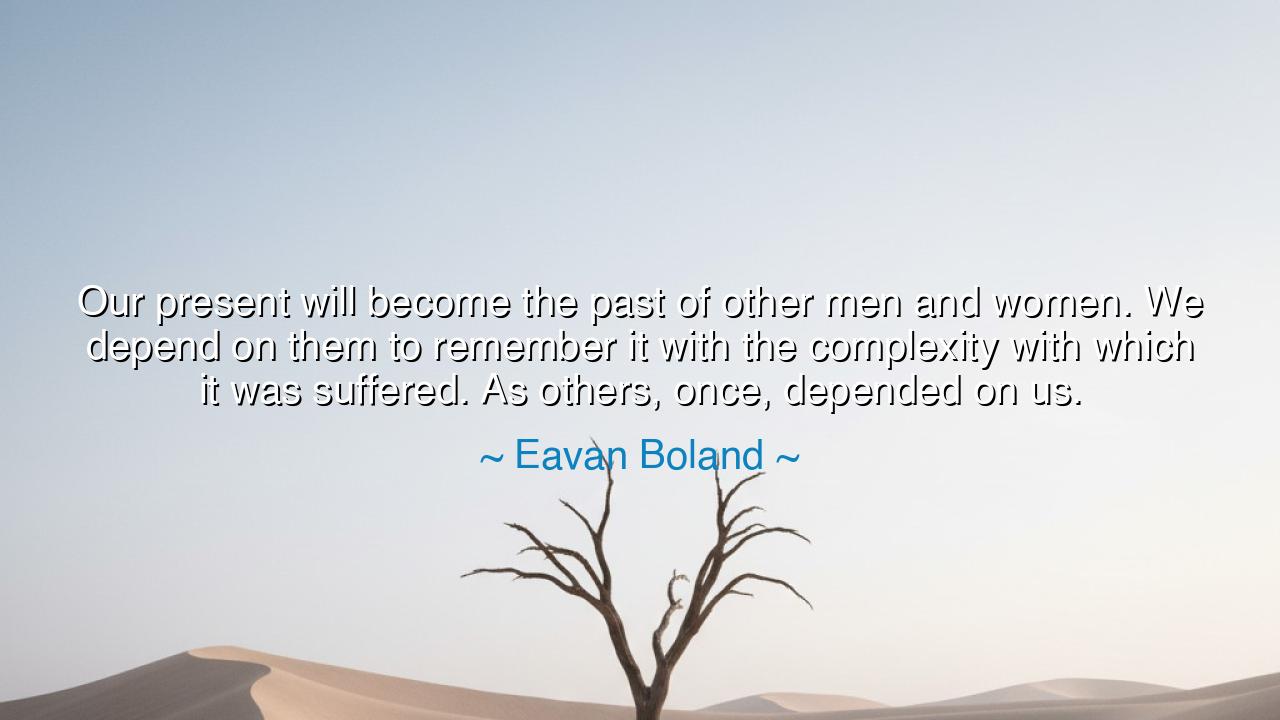
Our present will become the past of other men and women. We
Our present will become the past of other men and women. We depend on them to remember it with the complexity with which it was suffered. As others, once, depended on us.






Eavan Boland’s words—"Our present will become the past of other men and women. We depend on them to remember it with the complexity with which it was suffered. As others, once, depended on us."—carry the weight of centuries within their breath. In them lies the eternal chain of memory: that what we endure today shall be the inheritance of tomorrow, and what was borne by those before us becomes the soil from which we rise. The present is not fleeting, but a seed; the past is not gone, but living in the hearts of those who will keep it alive.
To suffer is to live deeply, to endure both the glory and the wound of existence. Boland reminds us that the complexity of our struggles must not be reduced to simplicity or forgotten in haste. For every sorrow carries within it a lesson, and every joy is woven with shadows. To remember rightly is not to glorify nor to condemn, but to hold the truth in its fullness, to honor what was lived as it was lived.
History reveals the power of such remembrance. After the horrors of World War II, survivors of the Holocaust cried out: “Never forget.” They knew that their present anguish, if not faithfully remembered, could be reduced to dust and denial. They depended on the generations to come to remember the suffering in all its complexity—the cruelty, the courage, the despair, and the endurance. In this act of remembrance lies both justice and protection, ensuring that memory itself becomes a shield against repetition.
Boland’s words also whisper of reciprocity. Just as we look back and honor the sacrifices of those who came before—freedom fighters, poets, mothers, builders—we too will be judged by those who come after. Our present shall become their past, and they will shape it in the telling. Shall they recall it as shallow, or will they see its depth, its sorrows, its hopes? As others once depended on us to remember, so too must we live in a way worthy of being remembered.
Let future generations take heed: the work of memory is not passive, but sacred. To remember is to keep the souls of the past alive, and to fail in remembrance is to kill them a second time. Thus, Boland calls us to live our present with truth, to suffer with dignity, and to trust that those who follow will hold our days with the same reverence we hold theirs. For in this unbroken chain of memory lies the immortality of humankind.






MLMinh Le
Boland’s words remind me of the importance of perspective in shaping history. How much of the struggles we face today will be remembered, and how will they be interpreted? Do we owe it to future generations to tell the full, complex story of our time, even when it’s uncomfortable or difficult? And in doing so, will they appreciate the challenges we faced, or will the complexity of our present fade with time?
0G06 Gieng
This quote by Eavan Boland challenges us to think about the responsibility we have to future generations in how we remember and document our present. How much of our reality is shaped by the stories we tell about the past? Will the complexities of today's world be truly understood by future generations, or will they be lost to time and the biases of those telling the story? How can we ensure that history is remembered with empathy and truth?
L7Vu Ngoc Lan - Lop 7a4
Boland’s quote highlights the idea that our present struggles will one day be viewed as history, and that future generations will depend on us to tell the truth. How do we make sure that the complexity of our struggles is not lost in the process of remembering? Can we trust that future generations will have the context and understanding to interpret our times accurately, or will they be swayed by oversimplified narratives?
UTUyen trang
Eavan Boland’s quote really makes me reflect on the role of memory in shaping history. How will future generations remember the struggles and complexities of today? Do we truly understand the weight of our current actions, knowing that they will be viewed through a different lens in the future? How can we ensure that history is not simplified or misunderstood, but remembered with the same depth and nuance with which it was experienced?